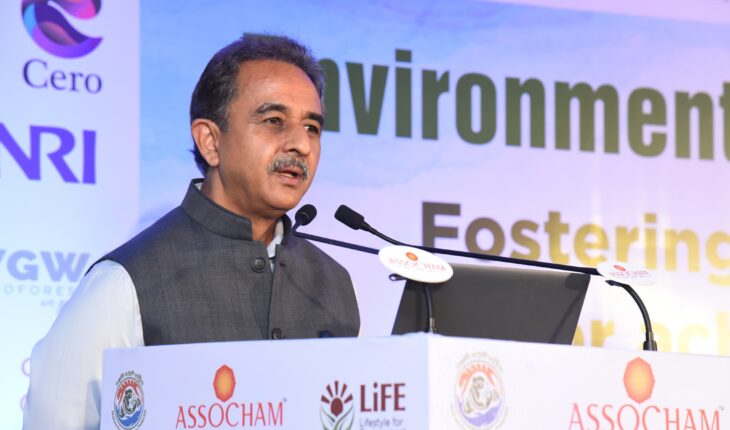New Delhi : Speaking at the ASSOCHAM Environment and Carbon Conference Kirti Vardhan Singh Hon’ble Minister of State, Ministry of Environment, Forest and Climate Change, Government of India shared that Government is doing the part with policies and it actively supports in achieving net zero under Viksit Bharat 2047. Of course, climate change is a big problem, we all know that and the effects of climate change are not defined by political or national borders. We all know that our country is very heavily dependent on our agricultural producers. So, climate change is basically a boundary-less phenomenon that we are facing.
And of course, we are doing our own bit in building our climate resilience and achieving our targets, our NDC targets. But at the same time, it also depends a lot on what is happening in the rest of the world. And Mission for Life is one of the areas which we also have to look. Whenever we talk about climate change, when there are discussions and deliberations on UNFCCC and COP on the world stage, the majority of the focus is on industrial outputs, on how our industry can cope up with climate change and what changes are needed in terms of infrastructure.
One of the key challenges that I feel our country faces is the lack of proper technology or the cutting-edge technology that is needed. If you talk about a circular economy, if you talk about converting our waste into worth, oblique wealth, when it comes to all this, we have a shortage of technology. We have already achieved the emission intensity of GDP, where the achievement target was 33% by 2030. We have already achieved 40% of our electrical installed capacity through non-fossil fuel sources. Again, 9 years before our target, he added.
A circular planning whereby whatever methods we adopt, whatever pathways we discover or research on, the ultimate goal is to achieve net zero. So, we have to take multiple facets into account when we talk about achieving net zero, when we talk about fighting climate change, when we look forward to the future that we are going to give our future generations to our children. So, our research has to be more focused towards finding the right technology or developing technologies towards greener industries and towards low carbon emission.
Archana Varma, IAS, Mission Director, National Water Mission, Ministry of Jal Shakti, GoI discussed India has had, as we all know, historically India has had a low history of carbon emission. We have just contributed 4% of CO2 emissions despite housing 18% of the population. The Jal Jeevan Mission, in which 19 crore rural households are to be supplied with drinking water and already 14 crores and above have been supplied with drinking water. Govt is also working on the National Mission for Clean Ganga, in which the objective is to clean and reduce the pollution in Ganga. And we have the National River Conservation Directorate, which performs a similar function for the other rivers.
The National Water Mission, wherein the goal is that we use water efficiently and increase water use efficiency, especially in the industrial, agriculture and domestic sector by 20 percent, so that we achieve the parameters of water conservation and water security by 2047. Also, the scheme of Atal Bhujal Yojana, which basically relates to, we all know that groundwater table in many parts of India is really depleting. So, to ensure that groundwater table doesn’t deplete, we have a community-led Atal Bhujal Yojana. We have the Jal Shakti Abhiyan 2019, which has its major objective of creating awareness and being a people-led movement for water conservation. These are the schemes which directly or indirectly, because they all focus on growth with sustainability, will lead to reduction in energy consumption. Water sector plays a crucial in achieving net zero . It enhances energy efficiency and also decease reliance on fossil fuel. Healthy wetlands, watersheds contribute also contribute to carbon sequestration. Water recycling and reuse helps minimise fresh water consumption and energy.






